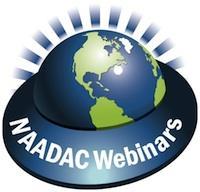Treating Substance Use Disorders in Brain Injury Survivors
Free NAADAC Webinar
Wednesday, January 27, 2016 @ 3-4:30pm ET (2CT/1MT/12PT)

Watch: On-Demand Recording (coming soon...)
Download: PowerPoint Slides (coming soon...)
CE Credit: Online CE Quiz (coming soon...)
Answers: Live Event Q & A (coming soon...)
Description: A brief overview of brain injury including the functional, cognitive, and emotional changes that can occur. The webinar will also review the occurrence of substance use disorders among brain injury survivors and how treatment needs to be modified in order to be effective with this population. Treatment strategies and modifications will be reviewed.
Learning Objectives:
- Understand basic functions of the brain and how these are altered after brain injury.
- Understand how substance use disorders impact brain injury recovery.
- Learn ways to modify addiction treatment for brain injury survivors.
Price: Education is FREE to all professionals
Earn Continuing Education Credit: If you have watched the webinar (either live or on-demand), you are eligible to receive a continuing education (CE) certificate to verify your time spent learning. To apply (only after watching the webinar), complete and pass the online CE Quiz at the top of this page. Members of NAADAC receive a Certificate of Completion for 1.5 CEs for free. Non-members of NAADAC receive 1.5 CEs for $20 (make payment here). A CE certificate will be emailed to you within 21 days of submission and receiving payment, if applicable. Click here for a complete list of who accepts NAADAC Continuing Education Credit.
Presenter:
 |
Christine Brenton, LPC, LADC, CBIS has worked in a variety of capacities within the substance abuse and brain injury fields over that last 11 years. She began doing case management work while completing my education and after graduation moved into a more clinical setting, providing counseling services and supervision to other clinicians. She assisted in creating and supervising two separate treatment programs for brain injury survivors, one recreational in nature and the other focused on substance abuse treatment. Part of that supervisory role included training other staff around mental health basics and the treatment of brain injury. She has also participated in running a support group for survivors. She is currently partner of a private practice now in its third year of operation that has a total of four clinicians and specialize in treating addiction, brain injury, mood disorders, and family issues.
|
Who Should Attend: Addiction professionals, employee assistance professionals, social workers, mental health counselors, professional counselors, psychologists, and other helping professionals that are interested in learning about addiction-related matters.








